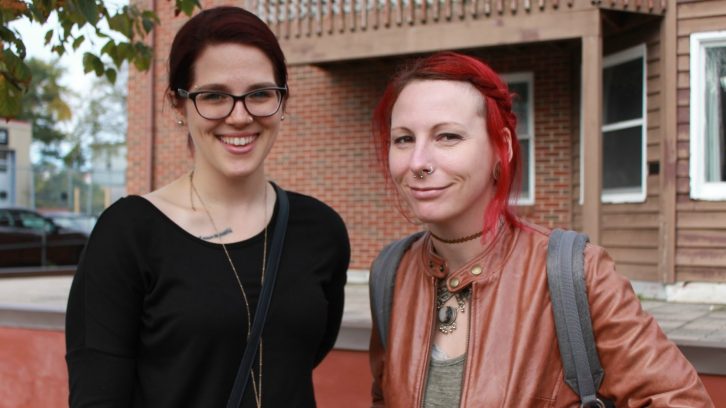Health
Eating disorder support centre coming to Halifax
Three women who've had eating disorders opening alternative treatment centre

caption
Heather Evans (right) and Meghan Clarkston (left) are opening a support centre for people with disordered eating
caption
Meghan Clarkston (left) and Heather Evans (right) are opening a support centre for people with disordered eating.Heather Evans pulls her chair in a little closer to her business partner. Evans was officially diagnosed with anorexia in 2012.
She remembers struggling with body dysmorphia, a preoccupation with body size, as early as age five.
Living in Cape Breton at the time, she found there were a lack of treatment options available.
Evans was forced to travel out of province, to Moncton, N.B. and back, for treatment.
She explains that most treatment services in Nova Scotia require a diagnosis, something not everyone meets the criteria for or feels comfortable getting.
“The clinical route, I was always kind of frustrated with. I was never sick enough to be included in any of the treatment there. Then I saw a naturopath and that is when I started taking a holistic route.”
Evans, now a registered holistic nutritional consultant recognized the lack of non-clinical support in Halifax and decided to create her own.
“I want to be able to provide knowledge for other people. It’s just kind of a no brainer,” Evans says.
She, along with fellow holistic nutritional consultants Meghan Clarkston and Laura Moffatt, created Reclaim – Nourish, Discover, Thrive, a wellness centre offering support to those with disordered eating. It’s set to open next May.
All three women struggled with eating disorders.
“When I started to eat again,” says Evans, “I had a dietitian, but I was never taught about the way my body was going to react to food.”
“I was never taught about how painful eating was going to be, physically, or how many issues I was going to have after I had been in recovery for a while.”
Reclaim will offer support from consultants, as well as workshops and services like reiki, reflexology and yoga.
While a clinical treatment approach often places focus on psychological intervention, a holistic approach focuses more on encouraging healing on all levels: physical, emotional, mental and spiritual.
There’s also an emphasis on nutrition.
Clarkston is not new to this type of environment. She works as a peer mentor with Eating Disorders Nova Scotia, a non-profit organization offering free support services in the province.
“As mentors we hear a lot of feedback about struggles of individuals with limited resources within Nova Scotia,” says Clarkston.
Michelle Hebert-Boyd, executive director of the organization, agrees.
“The more things that we can have out there for people to access and find a way that’s going to work for them, yeah, that’s beautiful,”
Hebert-Boyd says.

caption
Statistics estimate that eating disorders affect from 150,000 to more than 600,000 people across Canada.“Making those comfortable spaces and meeting people where they are and just having the one on one relationship with someone who’s been there, it would have been so wonderful for me if I’d had that.”
Hebert-Boyd says they are seeing a rise in the number of men, middle-aged women and binge-eaters reaching out for support.
Like Eating Disorders Nova Scotia, Reclaim will not serve as a treatment facility but as a support to the clinical route, or an alternative to those who don’t require formal treatment.
“It’s not going to be us telling them how to reach milestones, it’s going to be finding what works for you,” says Evans.
Reclaim will allow people to design their own recovery with support – no need for a diagnosis.
Insurance programs don’t often cover these types of support. The women plan to lower costs as much as possible to make services accessible.
Though there is no set location as of now, they hope to find a home in the city’s north end.

